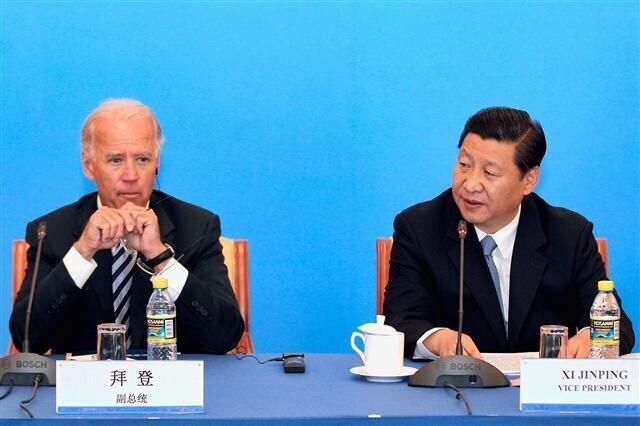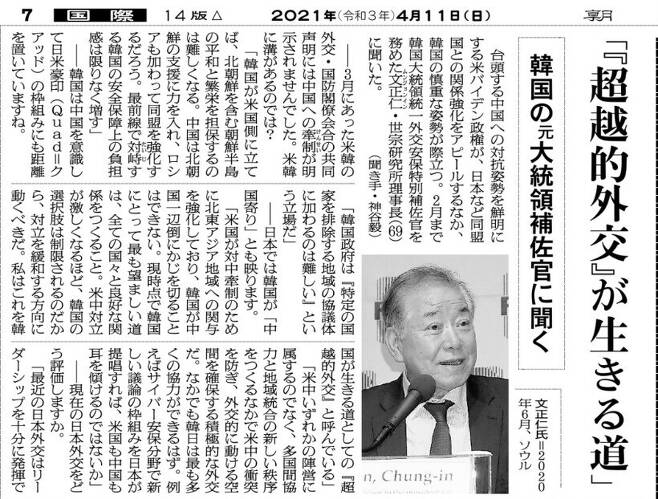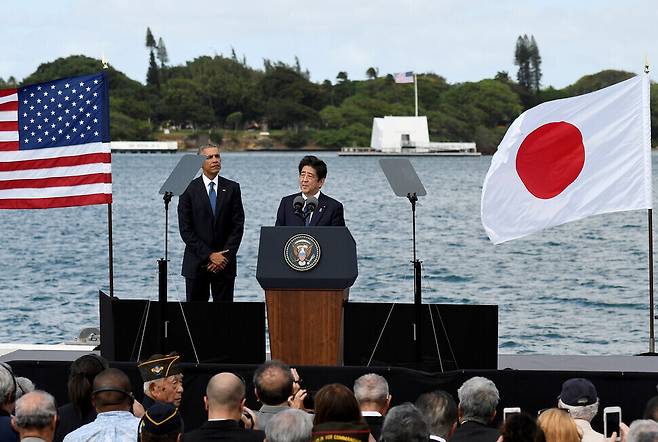[Reporter's notebook] Can S. Korea transcend US-China rivalry?
이 글자크기로 변경됩니다.
(예시) 가장 빠른 뉴스가 있고 다양한 정보, 쌍방향 소통이 숨쉬는 다음뉴스를 만나보세요. 다음뉴스는 국내외 주요이슈와 실시간 속보, 문화생활 및 다양한 분야의 뉴스를 입체적으로 전달하고 있습니다.

Moon Chung-in, chairman of the Sejong Institute, once again stirred up debate using the phrase “transcendental diplomacy” Sunday in an interview with Japanese newspaper the Asahi Shimbun. Moon had a long stint as South Korean President Moon Jae-in’s special advisor for unification, foreign affairs and national security.
South Korean newspaper the Chosun Ilbo slammed Moon Chung-in’s prescription, citing “concerns that such a diplomatic strategy could degrade South Korea into a second-tier ally of the US.” In an editorial, the newspaper voiced “fears that South Korea might diverge from the path of peace and prosperity that it has gone down for the past 70 years.” The editorial even brought up a remark made by Kim Joon-hyung, chancellor of the Korean National Diplomatic Academy, in a recently published book about South Korea being “addicted” to its alliance with the US.
This editorial offers insight into the mood among conservatives, who are gravely concerned that the Moon administration won’t pursue what they think is the right policy toward the US as rivalry between the US and China grows even more intense following Joe Biden’s inauguration as US president.

I don’t think that Moon Chung-in’s concept of “transcendental diplomacy” is as inherently flawed as the Chosun Ilbo’s attack would suggest. Moon proposed the concept to facilitate the coexistence of South Korea and Japan in a new cold war era while criticizing Japan for staking its entire foreign policy on the US.
“Recently, Japan has failed to exercise adequate leadership in its foreign policy. It has been passive and too dependent on the US,” Moon said.
He advocated “an active foreign policy that prevents clashes between the US and China and secures the space for diplomatic maneuvers while building a new order of multilateral cooperation and regional unification instead of siding with either the US or China.”
The question is whether this proposal is practicable. Since taking office at the end of January, Biden has called for a coalition of allies who share democratic values, regarding the current conflict between the US and China as an “inflection point” in human history when the balance will tilt toward either democracy or autocracy. Toward that end, the US organized a summit of the Quad, or Quadrilateral Security Dialogue, on March 12 and has been bent on strengthening trilateral cooperation with Seoul and Tokyo.
But now, a prominent figure with considerable influence on the foreign policy and national security policy of South Korea, a key American ally, has cautioned South Korea against unilaterally siding with the US and has urged Japan to follow suit. That’s likely to increase American concerns about its alliance with South Korea significantly.

It’s also unlikely that Japan will heed Moon Chung-in’s appeal, considering that it greatly expanded its alliance with the US following a territorial dispute with China over the Senkaku Islands (known in China as the Diaoyu Islands) in 2010.
The past seventy years of the Republic of Korea can be summarized as a history of conflict between those, like Moon Chung-in, who believe that South Korea can chart its own destiny by taking an independent line and those who believe that South Korea needs to watch where the wind is blowing and go with the flow.
Those in the former camp think that Korea’s independence was achieved by the bloodshed by the freedom fighters, while acknowledging the major contribution of the Allied Powers. That was the path chosen by Kim Gu, Lyuh Woon-hyung, and Kim Kyu-sik.
Those in the latter camp regarded Korea’s independence as being due to the victory of the Allied Powers and swiftly assented to the “grim reality” of the Cold War alignment. Former president Rhee Syngman harshly criticized Kim Kyu-sik when Kim embarked on negotiations with North Korea to prevent the division of the Korean Peninsula in April 1948, predicting that Kim would be ridiculed for his ignorance of larger trends.
During the thirty years since the end of the Cold War, there has been an ongoing attempt to reunite South and North Korea through Kim Dae-jung’s “sunshine policy,” Roh Moo-hyun’s advocacy of a “balancer on the Korean Peninsula,” and Moon Jae-in’s pursuit of a “Korean Peninsula peace process.” But unfortunately, that national mission remains incomplete today, as we stand on the brink of a new cold war.
Perhaps that’s why an attempt to think about other possibilities in foreign policy is being met with criticism about “ignorance of larger trends,” echoing what happened 70 years ago.
By Gil Yun-hyung, staff reporter
Please direct comments or questions to [english@hani.co.kr]
Copyright © 한겨레. 무단전재 및 재배포 금지.
- 서울형 상생 방역?…경기·인천 ‘오세훈표 민폐 방역’ 비판
- “일 후쿠시마 방사능 오염수 방류는 ‘핵 테러’…철회하라”
- ‘이재명 눈도장’ 차례로…경기도청 찾은 민주당 대표 후보들
- 4월에 한파주의보…내일 아침 오늘보다 10도 ‘뚝’
- ‘소통’ 강조한 김남국, 지지자들에게 ‘반문 커뮤니티’ 가입 권유…“좌표찍기냐”
- ‘1㎏ 6300원’ 비싼 대파, 5월부터 싸진대요
- 미 경찰 “테이저건 쏘려다 ‘총격’ 사망”…잇단 흑인 희생에 시위 ‘격렬’
- 장르물, 여성 드라마 피디가 주름잡다
- 후쿠시마 오염수 정보공개 안한 일본…“국내 영향 분석 불가”
- [김양희의 맛있는 야구] 프로야구 인기, 경고등이 들어오다